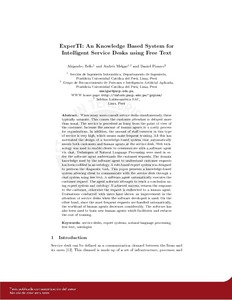| dc.contributor.advisor | Melgar Sasieta, Héctor Andrés | |
| dc.contributor.author | Bello Ruiz, Alejandro Toribio | es_ES |
| dc.contributor.author | Melgar, Andrés | es_ES |
| dc.contributor.author | Pizarro, Daniel | es_ES |
| dc.date.accessioned | 2017-04-17T21:15:11Z | es_ES |
| dc.date.available | 2017-04-17T21:15:11Z | es_ES |
| dc.date.created | 2017 | es_ES |
| dc.date.issued | 2017-04-17 | es_ES |
| dc.identifier.uri | http://hdl.handle.net/20.500.12404/8447 | |
| dc.description.abstract | When many users consult service desks simultaneously, these
typically saturate. This causes the customer attention is delayed more
than usual. The service is perceived as lousy from the point of view of
the customer. Increase the amount of human agents is a costly process
for organizations. In addition, the amount of sta turnover in this type
of service is very high, which means make frequent training. All this has
motivated the design of a knowledge-based system that automatically
assists both customers and human agents at the service desk. Web technology
was used to enable clients to communicate with a software agent
via chat. Techniques of Natural Language Processing were used in order
the software agent understands the customer requests. The domain
knowledge used by the software agent to understand customer requests
has been codi ed in an ontology. A rule-based expert system was designed
to perform the diagnostic task. This paper presents a knowledge-based
system allowing client to communicate with the service desk through a
chat system using free text. A software agent automatically executes the
customer request. The agent software attempts to reach a conclusion using
expert system and ontology. If achieved success, returns the response
to the customer, otherwise the request is redirected to a human agent.
Evaluations conducted with users have shown an improvement in the
attention of service desks when the software developed is used. On the
other hand, since the most frequent requests are handled automatically,
the workload of human agents decreases considerably. The software has
also been used to train new human agents which facilitates and reduces
the cost of training. | es_ES |
| dc.description.uri | Tesis | es_ES |
| dc.language.iso | eng | es_ES |
| dc.publisher | Pontificia Universidad Católica del Perú | es_ES |
| dc.rights | info:eu-repo/semantics/closedAccess | es_ES |
| dc.subject | Sistemas expertos (Computación) | es_ES |
| dc.subject | Sistemas de información | es_ES |
| dc.subject | Computación--Soporte técnico | es_ES |
| dc.subject | Procesamiento de lenguaje natural (Computación) | es_ES |
| dc.title | ExpertTI : an knowledge system for intelligent service desks using free text | es_ES |
| dc.type | info:eu-repo/semantics/masterThesis | es_ES |
| thesis.degree.name | Maestro en Informática | es_ES |
| thesis.degree.level | Maestría | es_ES |
| thesis.degree.grantor | Pontificia Universidad Católica del Perú. Escuela de Posgrado | es_ES |
| thesis.degree.discipline | Informática | es_ES |
| renati.advisor.dni | 10145776 | |
| renati.discipline | 611077 | es_ES |
| renati.level | https://purl.org/pe-repo/renati/level#maestro | es_ES |
| renati.type | http://purl.org/pe-repo/renati/type#tesis | es_ES |
| dc.publisher.country | PE | es_ES |
| dc.subject.ocde | https://purl.org/pe-repo/ocde/ford#1.02.00 | es_ES |





